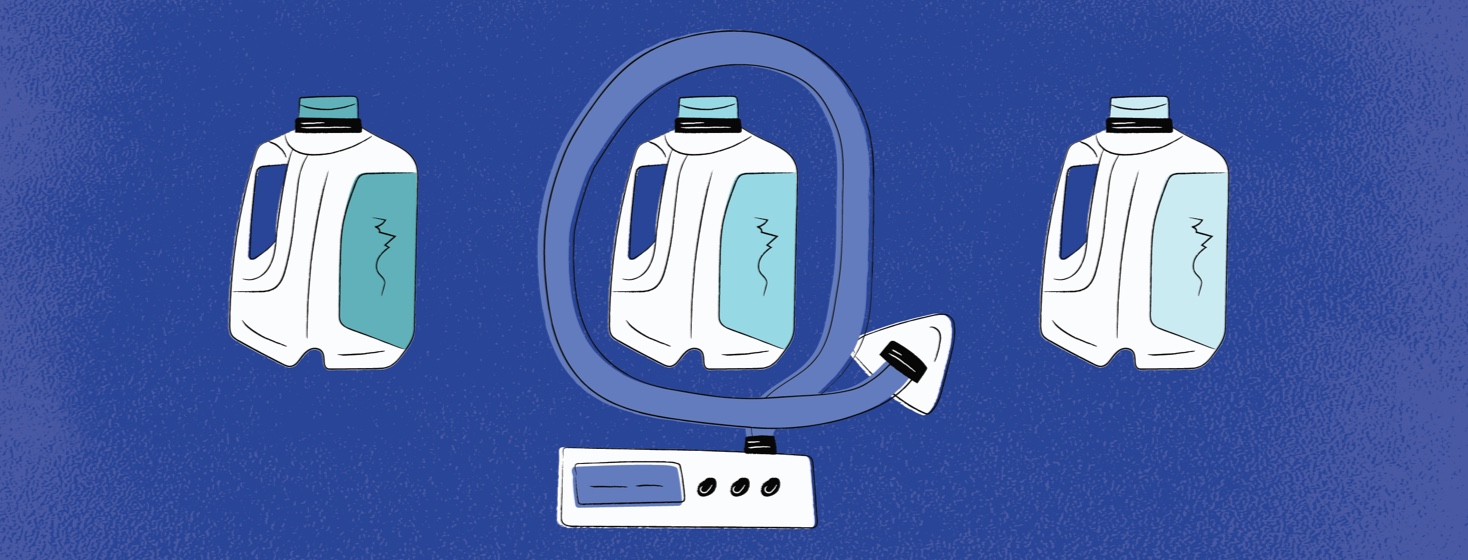Not All Water Is the Same When It Comes to CPAP
Two years ago, I went on a 10-day business trip to Arizona. I packed my CPAP (continuous positive airway pressure) machine, something I normally do when I travel. The plan, as usual, was to pick up some distilled water from a nearby pharmacy once I settled into my room.
It’s not a great solution, as I always need to buy a whole jug (the only option) and end up leaving more than half of it behind. But CPAP machines are built to function using distilled water and require its use for operation.
When I got to my destination, I noticed no stores within walking distance. I checked the gift shop and they said they didn’t carry distilled water, only vapor distilled water with electrolytes.
“People just use that. It works fine,” they said. Hmmm. Not according to my CPAP machine manufacturer. (And yes, I did alert the clerk to this, and it was the first they’d heard of it.)
Why distilled water for CPAP?
The beauty of distilled water is that all the contaminants and minerals have been removed. This makes it 100 percent safe to use in a machine that delivers humidified pressurized air to help you breathe without obstruction at night. It’s also the reason why baby humidifiers require distilled water to work safely. It’s unhealthy and unsafe to breathe in minerals and contaminants.
Other kinds of bottled water and tap water (boiled or not) aren’t 100 percent free of minerals or chemicals either, only water that’s been distilled. This includes vapor distilled water with electrolytes. Why? Electrolytes (otherwise known as minerals, such as calcium, magnesium, and potassium) have been reintroduced into the distilled water.
Your CPAP machine may not function correctly if you use water that has minerals in it. They’re abrasive and can damage both the water chamber and the plastic materials and mechanisms within the machine. If you’ve spent hundreds of dollars (or more) on a CPAP machine, this isn’t a good way to protect your investment.
Options exist!
Don’t skip using CPAP because there isn’t distilled water at your destination. Instead, try these options.
Go shopping upon arrival
I’ve found that stopping by a drugstore near the airport before heading to my lodging takes care of the problem. This, of course, only works if you can walk there or rent a car or ask a loved one to swing by the store. I’ve even had a rideshare driver wait in the car while I picked up a jug en route. Or, scout out your hotel ahead of time and find a drugstore nearby. Pay them a visit as soon as you arrive.
Ask your host to provide you with water
I did this once. It’s no big deal to ask a friend or family member in another state to spring for a $1 bottle of distilled water to keep at their house. They can use the rest for ironing or other household uses.
Pay the Uber fare
It’s not a great solution, but it’s better than risking your machine functionality or your health. Back in Arizona, I ended up paying $14 for a rideshare service to the nearest pharmacy for a $1 jug of distilled water. Better than nothing, though!
Pack TSA-approved water bottles
Yes, these exist! Small bottles of distilled water packaged specifically for airline travel. I have successfully used 2 brands of PAP-specific distilled water that are approved by the Transportation Security Administration (TSA) for air travel: H2Doze and AquaPap. Another brand, Resway, is also on the market. These manufacturers use a firmer gauge plastic to survive changing air pressure during flight. The convenient bottle sizes mean you can pack just what you need without having to toss the rest. When traveling, store it in your CPAP bag or pack in checked luggage (I do both). Bottles may be screened at the security checkpoint, but staff should know to recognize these by now.
Once you arrive at your destination, you can just get on with your business without making that trip to the local drugstore … which might be miles away or closed after 10 PM.
Also note: You can now buy TSA-approved water for CPAP once you’re past the security checkpoint at a select few airport concourses. This isn’t widespread yet, but with any luck, this will become a regular option like paperback books, earbuds, sudoku puzzles, and trail mix.
Skip the humidifier
You can also turn off the humidifier feature if you can’t find water for it. Personally, the humidity is my favorite part of the whole CPAP experience, but other people might not like it or care. While humidifying the air makes its intake far more comfortable to your mucus membranes, you may use your CPAP without humidity.
Interested in reading more about getting the most out of your CPAP? Explore our featured collection of tips and tricks for CPAP users.

Join the conversation